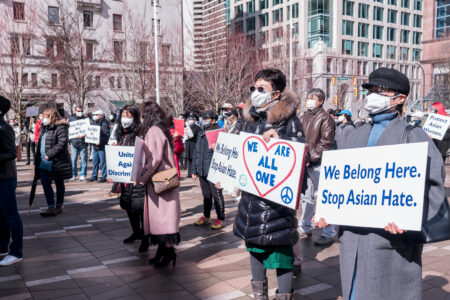
The world of work is changing – but some of the racial biases held by employers are slow to shift, particularly in smaller companies.
Our recent study Do Large Employers Treat Racial Minorities More Fairly? continued an analysis that was started several years by co-author Philip Oreopoulos on how job applicants with Asian names fare when compared with applicants with Anglo-Canadian names.
The original data collected in Toronto and Montreal in 2008 and 2009 showed that job applicants with Asian names were 28 percent less likely to be called for an interview than applicants with Anglo-Canadian names, even when both groups had equivalent qualifications and their education and work experience were Canadian. For Asian-named applicants with foreign education and foreign work experience, the picture was twice as dismal: they were 62.5 percent less likely to be called in for an interview than Anglo-Canadian-named applicants with Canadian qualifications and experience.
In our original dataset, 12,910 simulated resumés were sent in response to 3,225 real online postings for jobs requiring a Bachelor’s degree in Toronto and Montreal. The resumés contained standardized qualifications and varied only in the ethnic character of the applicant’s name. The fictitious applicants had Anglo-Canadian names (Greg Johnson, Emily Brown) or Asian names: Chinese (Lei Li, Xuiying Zhang), Indian (Samir Sharma, Tara Singh) or Pakistani (Ali Saeed and Hina Chaudhry).
Our most recent study analyzed factors that might affect discriminatory hiring practices: the size of an employer, the skill level of the posted job and the educational level of the applicant.
First, we divided the employers into large (500 or more employees), medium-sized (50 to 499 employees) and small (less than 50 employees). We expected that large employers might treat applicants more fairly because they have greater resources devoted to recruitment and often have a more professionalized recruitment process. They also tend to have more experience with ethno-racial diversity in their workforces.
Asian-named applicants’ relative callback rates were indeed the lowest in small and medium-sized organizations, and somewhat higher in the largest employers.
Asian-named applicants’ relative callback rates were indeed the lowest in small and medium-sized organizations, and somewhat higher in the largest employers. Compared with applicants with Anglo names, the Asian-named applicants with all-Canadian qualifications got 20 percent fewer calls from the largest organizations, but 39 percent fewer from the medium-sized organizations and 37 percent fewer from the smallest organizations. So, the disadvantage of having an Asian name is less for applicants to the large organizations, although it is still evident.
Looking at treatment of Asian-named applicants with some foreign qualifications, we found the largest organizations are generally the most likely to call these applicants for interviews. Large employers called these applicants 35 percent less often than Anglo-Canadian applicants with Canadian education and experience; medium-sized employers called 60 percent less often, and the smaller employers called 66 percent less often.
We were also interested in whether the skill level of the job affected discriminatory hiring practices and, in particular, whether Asian-named applicants faced greater barriers in higher-skill jobs, which are likely to be better paid. We found that the extent of discrimination against Asian-named applicants with all-Canadian qualifications is virtually the same for both high-skill jobs and lower-skill jobs. For the high-skill jobs, these applicants were 33 percent less likely to get a call; for the low-skill jobs, 31 percent less likely.
Skill level matters much more when Asian-named applicants have some foreign qualifications. Overall, these applicants had about a 53 percent lower chance of receiving a callback than comparable Anglo-Canadian applicants. But their rate of receiving calls is significantly lower at higher skill levels: they receive 59 percent fewer callbacks for high-skill jobs, 46 percent fewer for low-skill jobs. Employers may respond less favourably to Asian-named and foreign-qualified applicants for higher-skill positions because in those jobs, more is at stake, and assessing foreign credentials is more difficult than checking local sources. Avoiding the issue by not calling applicants to an interview is apparently viewed as the safer option.
Acquiring a higher level of education in Canada did not seem to give Asian-named applicants much of an edge.
Finally, we asked whether having a higher level of education than Anglo-Canadian-named applicants would lessen the negative effect of having an Asian name. We found that Asian-named applicants with Canadian education including a Canadian master’s degree were 19 percent less likely to be called in for an interview than their Anglo-Canadian counterparts holding only a Bachelor’s degree. For Asian applicants with foreign qualifications and a Canadian master’s degree, the likelihood of a callback was 54 percent lower than the rate for less-educated Anglo-Canadian-named applicants. Acquiring a higher level of education in Canada did not seem to give Asian-named applicants much of an edge.
Overall, we found that employers both large and small discriminate in assessing Asian-named applicants, even when the applicants have Canadian qualifications; and they show even more reluctance to consider Asian-named applicants with foreign qualifications. These biases are particularly evident in hiring for jobs with the highest skill levels. However, there is a substantial difference between larger and smaller organizations. Larger organizations are more receptive to Asian-named applicants than smaller ones, whether or not the applicants have Canadian qualifications.
In order to fully understand the disadvantages that racial minorities experience in the Canadian labour market, it is crucial to go beyond surveys, in which discrimination may be hidden and difficult to identify. Audit studies like ours capture “direct discrimination” by observing actual employer responses to simulated resumés. This form of discrimination is particularly significant since the inability to get an interview may prevent potentially qualified job-seekers from finding appropriate work. Its effect may be compounded in promotions and other stages of the career process and in turn exacerbate ethno-racial income inequality in Canada.
Meanwhile, employers might also be unwittingly disadvantaged, because it can prevent them from finding the best-qualified applicants. Small employers are particularly disadvantaged since they may lack the resources and expertise to fully tap more diverse segments of the workforce.
A number of measures may help to reduce name-based discrimination in the hiring process. First, a relatively low-cost measure would be for employers to introduce anonymized resumés. They could simply mask the names of applicants during the initial screening, and then track whether this results in more diverse hiring. Second, employers should ensure that more than one person is involved in the screening and interview process and that the process of resumé evaluation is open and transparent. Lastly, hiring managers should receive training on implicit bias and how to recognize and mitigate their own biases when recruiting job applicants.
This article is part of the The Changing Nature of Work special feature.
Photo: Shutterstock.com
Do you have something to say about the article you just read? Be part of the Policy Options discussion, and send in your own submission. Here is a link on how to do it. | Souhaitez-vous réagir à cet article ? Joignez-vous aux débats d’Options politiques et soumettez-nous votre texte en suivant ces directives.







